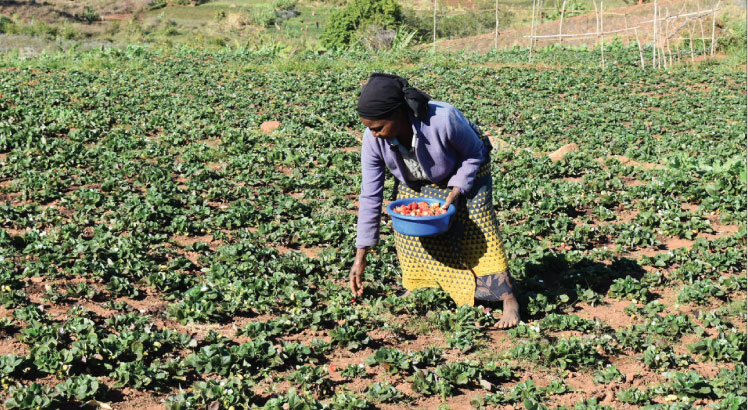Travelling on the meandering narrow tarmac up the peak of Zomba Plateau, groups of traders are seen selling strawberries fresh from the slopes.
As the free-growing strawberries are disappearing in the chilly heights of the country’s second-highest mountain, the mountainside communities are taking to their fields to remain in business.
In the mountainside villages under Traditional Authority (T/A) Mlumbe, locals have dedicated about 35 acres on the slopes to strawberry production.
The fruit has become a major cash crop for over 260 households in Chisamba, Chiphazi, Ngunga and Galamadzi villages.
Jimmy Mbwana, a farmer from Galamadzi, says the main fruit of the emerging trade in strawberries are the decent houses mushrooming in the rural locality.
Sasula picks ripe strawberries from her field
“Almost every household in these villages depends on income from strawberry,” he states.
Flora Sasula, 61, of Chiphazi Village, has grown strawberries for decades to meet the needs of their family of 11.
“I dropped out of school early, but still needed to make money. So, I started producing strawberry,” she says.
Like most of their neighbours, Sasula and Mbwana have replaced their leaky grass-thatched houses with modern ones roofed with corrugated iron sheets.
They have also acquired other assets, including livestock, using proceeds of strawberry farming.
Sasula plans to buy a three-tonne lorry for hire to increase her income sources.
However, it has not all been rosy.
For years, the farmers could not reap enough for their sweat as they mostly sold their produce to mobile buyers at low prices.
The detested buyers mostly resell the fruit at higher prices in Zomba and Blantyre.
The mother of nine says: “The buyers, who dictate low prices for crops they did not sow, sentenced to hard labour.
“We used to get too little from the back-breaking toil of producing the fruit. Mind you, strawberry is too involving and we were not compensated fairly.”
This forced 80 of the farmers to gang up and start demanding better deals from buyers.
The establishment of Nankhunda Association of Strawberry gave them more bargaining power, tipping the scales in their favour.
“Since we realised the worth of our produce, we started charging accordingly to improve our livelihoods and buy farm inputs for better yields,” he says.
Now they sell a basinful at K10 000 and K12 000.
The improved living standards in farmers’ households testify to the profitability of the fruit as harvests keep rising.
But the certainty that they are still losing by selling raw strawberries haunts them.
Mbwana, 50, says: “We could meet the high demand, but still throw away those not sold.
“We didn’t know what to do with the leftovers.”
In 2022, the association embarked on a project to add value to their fruits by producing juice for sale.
They received a K23.9 million grant from the Malawi Watershed Services Improvement Project (Mwasip) funded by the World Bank.
They have procured a juice-making machine and refrigerator for the project.
Zomba District Council agribusiness officer Helen Bango says the development will help farmers to maximise income from their crop.
“Juice has higher value than raw fruits,” she says. “They will earn more because there is already high demand of that natural juice among city residents and hotels.”
Nankhunda Association of Strawberry is among 12 smallholder farmer clusters in the district that received more than K166 million.
The grants are part of Mwasip’s $53 million fund to scale up landscape restoration in Machinga, Balaka, Neno, Mangochi, Zomba, Ntcheu and Blantyre in the Shire River catchment. The grants enhance farm enterprises’ capacity to benefit from businesses that do not harm the environment.
Apart from promoting agricultural practices that help farmers reap more from their small plots amid climate change, the project has equipped them with essential business skills to secure profitable markets.
Sasula is pleased to see that farmers now earn more from every fruit they harvest.
“This is key to sustainable development as increased income helps us keep hands off logging and charcoal production that have left the hills bare,” he says.
Thondwe agriculture extension development officer Shepherd Numeri says the grants complement national efforts to conserve degraded landscapes.
For him, environment-friendly businesses awaken people in endangered and degraded efforts to the importance of conserving the environment.
Numeri says: “They are unlikely to think of producing or selling charcoal, which contributes to environment degradation, for quick money because they will get more money from strawberry production.”
Mbwana believes: “Strawberry is a hidden treasure.
“We have been sitting on gold. This can transform our livelihoods if fully exploited as a commercial venture.”
The post Strawberries of Mount Zomba appeared first on The Nation Online.
 Moni Malawi
Moni Malawi 
